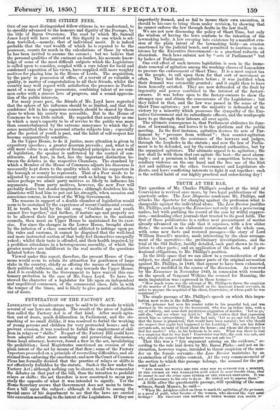FRUSTRATION OF THE FACTORY ACT.
LEcastanox by misadventure may be said to be the mode in which several of our laws are shaped. The result of the piece of legisla- tion called the Factory. Act is of that kind. After much agita- tion out of doors, much deliberation in Parliament, and the sto- maching of no small dislike, it was resolved to forbid the working of young persons and children for very protracted hours ; and to prevent evasion, it was resolved to forbid the employment of chil- dren in relays or " shifts." No part of the Factory Bill could have been adopted after moresearching and persevering discussion. Some local attorney, however, found a flaw in the act, invalidating the prohibition; local Magistrates sanctioned an evasion of the plain intent of the act by means of that flaw; some of the Factory Inpectors proceeded on a principle of reconciling difficulties, and ab- stained from enforcing the enactment; and now theCourt of Common Pleas has formally decided that the practice of relays or shifts is not effectively forbidden by the statute. Such is the law under the Factory Act; although nothing can be clearer, to all who remember the debates on that part of the bill, than the intention to prohibit relays or shifts : the act therefore is now construed to mean pre- eisely the opposite of what it was intended to signify. Yet the Home Secretary avows that Government does not mean to intro- duce a bill upon the subject; although it should be among the special cares of his department to see that the laws are carried into execution according to the intent of the Legislature. If they are
imperfectly framed, and so fail to insure their own execution, it should be his care to bring them under revision, by showing that he cannot enforce the law through faults in the law itself. We are not now discussing the policy of Short Time, but only the wisdom of having the laws conform to the intention of the lawmaking body. A law creeping into existence by a manifest eva- sion of the plain intent of the lawmaking body—an evasion sanctioned by the judicial bench, and permitted to continue in ex- istence by the Executive Government—is a practical reductio ad absurdum. Such laws subsist not by " acts of Parliament" but by lathes of Parliament.
One evil effect of such inverse legislation is seen in the imme- diate renewal of agitation among the working classes of Lancashire to procure the enforcement of Short Time. It is a most unjust tax on the people, to call upon them for that sort of movement so often. They had their agitation before ; it was justified when their demand was ostensibly granted ; and it ought then to have been honestly satisfied. They are now defrauded of the fruit by ingenuity and power combined in the interest of the factory- owners. It was before open to the factory-owners to show the stronger ease and obtain the concurrence of the Legislature ; but they failed in that, and the law was passed in the sense of the Short Time agitators ; yet now the majority is defrauded of its victory by a minority which possesses the sympathy of the Exe- cutive Government and its subordinate officers, and the work-people have to go through their labours all over again. The ultimate consequence is, that Parliament abdicates its func- tion of lawmaking, and leaves it to the platform and the public meeting. In the first instance, agitation decrees its acts of Par- liament by " pressure from without " ; then counter-agitation filches its law, with the assistance of the lawyers and Judges, through the loopholes in the statute ; and now the law of 13 ment is to be defended, not by the constituted authorities, but by the organized agitators. The ultimate appeal is to agitation ; the law shall lie with them that can agitate the best—the most alarm, ingly ; and a premium is held out to a competition between in- cendiary violence on the one hand and the free use of the Riot Act and military on the other. Government and Legislature ab- dicate, and leave conflicting interests to fight it out together: such is the settled habit of our highly practical and order-loving day !


























 Previous page
Previous page